How Long Does It Take to Buy a Car?
April 28, 2021
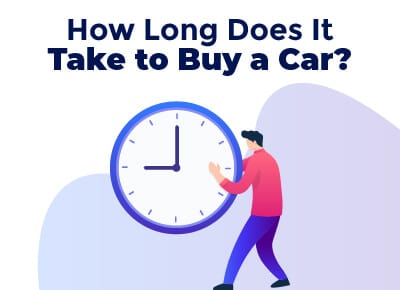

I am a serial entrepreneur and a consumer advocate. When I’m not helping car buyers, I love working on ventures that have a positive impact.
I run a cause marketing agency and serve on the board of Vayu Global Health where we are disrupting the medical industry and preventing the needless deaths of mothers and babies during childbirth.
Typically, it takes more time to find the right car than it does to purchase it, and fortunately, there are ways to speed up the process.
Whether you need a car quickly or are just very excited about your purchase, the process can seem lengthy.
Here is a breakdown of how much time you should spend on a new car purchase and ways to speed it up.
Table of Contents
How Long Does It Take to Buy A New Car?
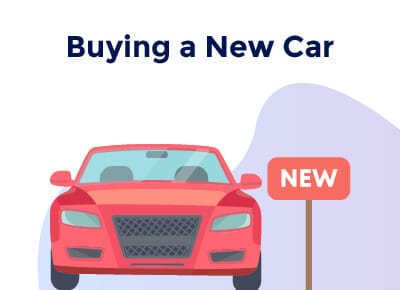 The average consumer spends 89 days in the market for a car and spends an average of 3.6 hours at the dealership making a new car purchase. Fortunately, buying a new car tends to be quicker than buying a used one, but it depends on many factors.
The average consumer spends 89 days in the market for a car and spends an average of 3.6 hours at the dealership making a new car purchase. Fortunately, buying a new car tends to be quicker than buying a used one, but it depends on many factors.
Additionally, if you order a car from a factory, you’ll have to consider delivery times. Delivery times from manufacturers in another country could take months, while domestically-built cars tend to take about eight weeks to arrive.
Buying a car involves many steps (which we’ll dive into shortly). The three primary factors that dictate the time to purchase a car are:
- Research. How long do you spend deciding on what car you want?
- Financing. Do you have financing through a bank or a dealer?
- Trade-in. You can expect to spend more time at the dealership with a car appraisal and trade-in.
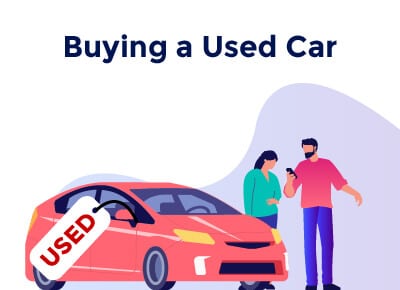
How Long Does It Take to Buy a Used Car?
Buying a used car often takes longer than buying a new one. When shopping for a used car, it can take longer to find one that meets your needs because the inventory is more limited.
A big reason buying a used car takes longer is because you have to spend extra time inspecting the car. You really want to make sure that you know the car's condition and do not purchase a lemon.
Why It Takes So Long?
There are several reasons why it can take a long time to buy a car:
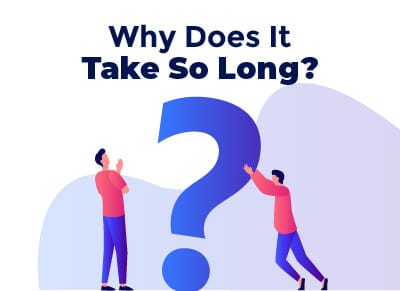 Find the Right Car. Sometimes you will spend days, weeks, or even months searching for a vehicle that matches your needs and budget.
Find the Right Car. Sometimes you will spend days, weeks, or even months searching for a vehicle that matches your needs and budget.- Inadequate Preparation. Many car shoppers don’t arrive at the dealership with the information they need, like their credit score or preapprovals.
- Dealership Tactics. Salespeople earn a bulk of their money from commission, so dealers rely on wearing buyers down, and this takes time.
- Trade-ins. If the dealer doesn’t give you a fair price on the trade-in, then you may need to shop around to find a better trade-in deal or spend time negotiating the trade-in price.
Timeline for Buying a Car
How long you spend on each portion of the car-buying process will greatly vary, but here is the basic timeline for buying a car:
Research Vehicles (1-30 Days)
How long it takes to research will depend on the market, especially for used cars. It’s often best to begin your research online and create a list of options before making any trips to dealerships or private sellers.
Research should include:
- Price. Price/cars in your budget
- Type. Used vs. new cars
- Payment Options. Will you lease, finance, or pay in full?
- Source. Dealership vs. private seller
Shopping (1-4 Days)
The shopping process involves visiting the dealerships and sellers to compare vehicles and prices. Check for any sales going on and test-drive options you are considering.
Again, this can take longer if you are shopping for a used car as the inventory is always changing.
Negotiation (1-2 Hours)
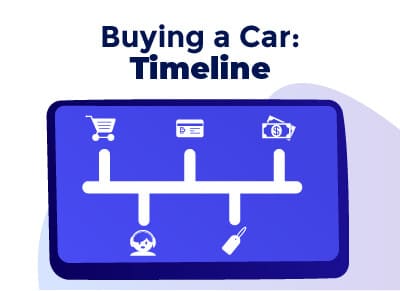
Before agreeing to purchase, negotiate the price. Negotiate based on the market value of the vehicle and how long it has been listed for sale. This is true when buying from a dealership or private party.
Beware that some used-car sites like Carvana do not allow negotiation and instead use haggle-free pricing.
Paperwork (1 Hour)
Here, you can talk about financing, leasing, gap insurance, extended warranties, and more. If you choose to finance through the dealership, your representative will evaluate your credit information and provide preapproval for a car loan.
Preapproval can be instant, or it can take a few days. Once you are preapproved (or if you pay cash), then you can finalize the purchase.
Insurance (30-60 Minutes)
Typically, you need to get insurance for your new car before leaving with it. Some insurance companies and states provide a grace period that gives you a set period after purchasing to change your insurance.
Researching ahead of time will help you choose the right insurance option quicker.
Title and Registration (Varies)
Typically, dealerships take care of at least a temporary registration for you. Some dealerships can handle the entire registration process and get your license plates. Other times, your registration and plates come in the mail later.
If you buy from a private seller, then you’ll need to head to your local Department of Motor Vehicles to register your vehicle.
During the research process, you should gather the paperwork and information you need to make registration a smooth process. During the registration, you’ll also transfer the car’s title.
How to Speed Up Car Buying Process
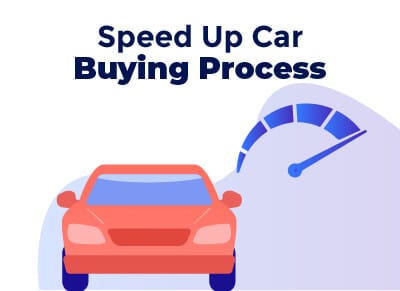 There are ways to speed up the process, and here are a few tips:
There are ways to speed up the process, and here are a few tips:
Know What You Want
If you have an exact make/model in mind, great! Even if you do not, figure out what features you do and do not want. Consider vehicle size, condition, comfort, safety, etc.
Based on your criteria, you’ll be able to narrow down your search to the appropriate vehicles.
Research Online
Start your search for a vehicle online. You can browse dealerships online, as well as used-car sites like Carvana and CarMax. In a matter of minutes, you can search for cars around the country.
This is far more time-efficient than going to all of the dealerships in your area just to look.
Bring These Documents to the Dealership
When it’s time to visit the dealership, prepare ahead of time by gathering the following documents:
- Driver’s license
- Payment or down payment. Cash, personal check, cashier check, or credit card.
- Registration for your current vehicle if you will trade it in.
- Proof of car insurance.
- Rebate documents.
Buy with Cash
When you purchase a vehicle with cash, you can skip the long meetings with the finance manager. Overall, paying with cash or your own source of financing can save a lot of time in the process.
However, you should keep in mind that dealers may have some enticing incentives for their financing options.
Best 0% APR Deals by Category
Frequently Asked Questions
How long is the car buying process?
The car-buying process typically takes 3-4 hours at the dealership. However, car shopping takes much longer (days, weeks, or even months) when you consider the research and preparation involved before the actual sale.
What's the longest part of the car buying process?
There are several parts of the car-buying process that can extend the time it takes. Research is typically the longest part of the process when buying a used car. For new car buying, negotiating and paperwork at the dealership take the longest.
Can I drive a car as soon as I buy it?
Check your state laws before driving a vehicle you just bought. In many states, you are allowed to drive the vehicle within a few days of the sale. Always keep the title and proof of insurance with you and register the vehicle as soon as possible.
How can I speed up the car buying process?
Here are the top ways to speed up the car buying process:
- Figure out what you want based on how you use your vehicle.
- Start your research online.
- Gather all necessary information and paperwork before going to the dealership.
- Buy with cash when possible.
How long does it take to get a title after buying a car?
If you pay for your vehicle outright, you can expect the title within 30 days. However, if you finance the car, then the lender may possess the physical title. In that case, you would receive the title after the final payment is made.
How long does it take to get a license plate from the dealer?
Many times, you can expect your plates from the dealer within two to three weeks. Some dealers may require you to pick up the plates when they are ready.
Posted in Car Buying Tips |




